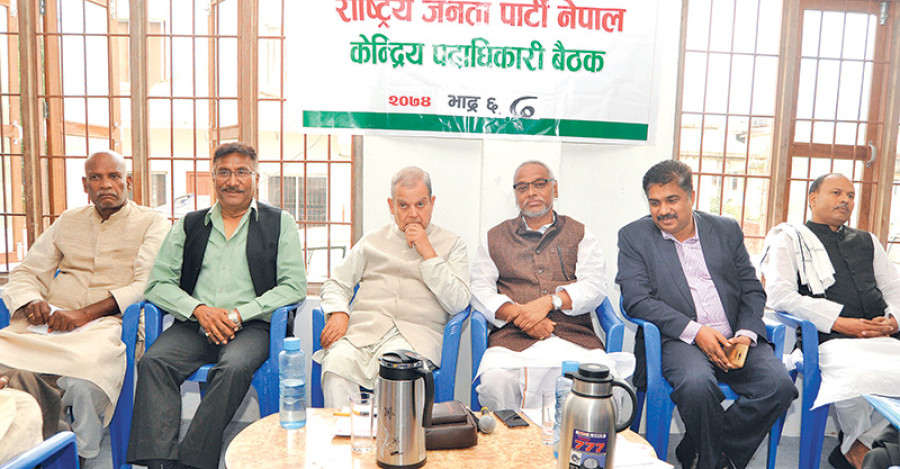Politics
Rastriya Janata Party, despite withdrawing support for government, joins in electoral alliance with ruling party
The electoral alliance is aimed solely at preserving its National Assembly seats, say Janata Party leaders, but commentators believe it will have consequences.
Tika R Pradhan
Despite withdrawing support for the government nine months ago, the Rastriya Janata Party Nepal has joined the ruling Nepal Communist Party in an electoral alliance over the upcoming elections to the National Assembly. Without the support of the ruling party, the Janata Party is afraid of losing its two seats on the Assembly.
On Wednesday, the parties signed a two-point agreement regarding the alliance but Janata Party leaders say that the agreement will not affect the party’s coalition with the Samajbadi Party Nepal in the Province 2 government and the ongoing talks for a merger.
“The Samajbadi Party continues to linger on our proposal to finalise the alliance and it was preparing to forge an alliance with the ruling party. But we sealed the deal,” said Keshav Jha, general secretary of the Janata Party. “If we had not signed the agreement, we would have lost our two National Assembly seats.”
The Rastriya Janata Party has long been pursuing an alliance with the Samajbadi Party, but little has come of the talks. In March, the party withdrew support for the government after the Kailali District Court handed a life sentence to party leader Resham Chaudhary, the primary accused in the 2015 Tikapur incident. The party has since been asking the Samajbadi Party to quit the government and join it in demanding constitutional amendments through street protests.
Out of the total eight National Assembly seats for Province 2, four—two Janata Party seats, and one each for Nepali Congress and the Samajbadi Party—are now vacant. The National Assembly operates through a lottery system, where Assembly members draw lots for two, four or six-year terms. Of the other four seats, two are occupied by the Nepal Communist Party (NCP) while the Nepali Congress and Samajbadi hold one each.
“If the Nepal Communist Party made a deal with the Samajbadi Party, we would lose our two seats and if we forged an alliance with Samajbadi or Congress, it would be difficult for us to secure both seats,” said Jha.
The Janata Party had earlier attempted to ally with the Samajbadi Party for the by-elections but the latter’s reluctance had irked the Janata Party, leading them to court the ruling party instead.
National Assembly members are elected by an electoral college consisting of Provincial Assembly members and heads and deputies of rural municipalities and municipalities.
If the election goes the way of the Nepal Communist Party and the Janata Party, the former will increase its seats to a total of four while Janata Party will retain its two.
The electoral alliance, however, is likely to create more pressure on the Samajbadi Party to expedite the merger process but a major precondition set by the Janata Party is quitting the government, which the Samajbadi party is unlikely to do anytime soon.
Instead, according to Minister for Communication Gokul Baskota, who is a close aide to Prime Minister KP Sharma Oli, it is the Janata Party that could join the government.
“There isn’t any limitation to the imagination when it comes to politics,” Baskota said during his weekly press briefing on Thursday. “The Janata Party had once supported the government. There were some issues in the past but now that’s over.”
Baskota went on to say that ruling party leaders would happily create space for the Janata Party in government. According to Janata Party Vice-chairman Brikhesh Chandra Lal, the party has not ruled out the possibility of joining the Oli administration, as long as the ruling party is positive about their demands, including constitution amendment.
Janata Party leaders, however, have said that the alliance is only a tactical move meant to save their National Assembly seats, political commentators say this could have long-term ramifications for national politics.
“This incident has eroded the spirit of the Janata Party as an opposition party,” said Chandra Kishore, a political commentator. “After withdrawing support for the Oli administration, the people of the Madhes had pinned high hopes on the party. Yesterday’s deal has smashed them all.”
The Janata Party has traded its moral high ground for just two National Assembly seats, he said.
Leaders from the Samajbadi Party too said the Janata Party’s decision could be fatal for the party.
“It would be a big political mistake if we forget our long-term fight for short-term gain,” said Prashant Singh, secretary of the Samajbadi Party. “We have taken this incident as a tactical move but if the party had fallen into the ruling party’s trap, that would be detrimental to our common long-term goal.”




 20.12°C Kathmandu
20.12°C Kathmandu















